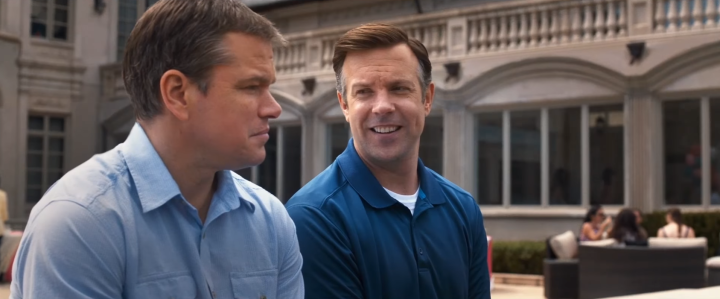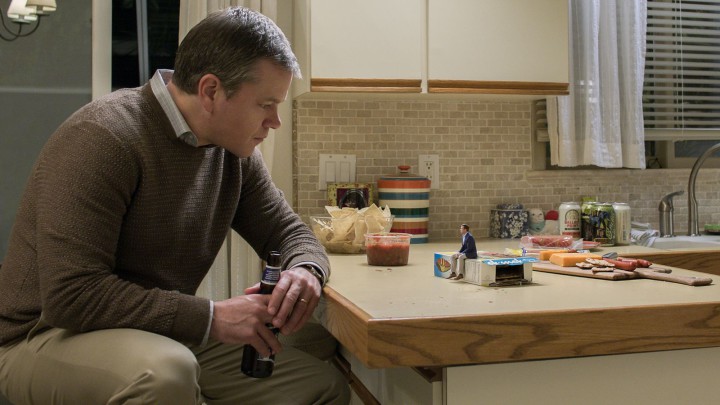Alexander Payne is one of those vestiges of the independent film renaissance of the ’90s, when small, personal movies with a social message could be produced without a pack of money-hungry studio execs trying to turn everything into a “cinematic universe” replete with sequel potential and endlessly exploitable intellectual properties. Payne’s caustic sensibilities, evinced in the best-known of his early works such as Election and Sideways, marked him as a definitive voice among a generation of filmmakers that has long since sold out. While Payne may have seemed the least likely to have softened with age, Downsizing presents a strong argument that this once-vital satirist has succumbed, at least partly, to the Siren’s call of mass-market appeal.
If Downsizing represents Payne at his most defanged, it’s still Payne. With longtime screenwriting partner Jim Taylor, Payne has crafted a high-concept premise with a distinctly Swiftian bent, a world in which the ills of consumption-driven capitalism can be solved through an irreversible process of miniaturization that reduces its subjects to the size of dolls while proportionately increasing the relative value of their net worth. It’s a setup with endless potential, most of which is squandered by an uncharacteristically meandering script.
Payne and Taylor focus on Paul Safranek (Matt Damon), the latest in their long line of schlubby everyman protagonists. An in-house occupational therapist at Omaha Steaks with a social climber wife, Paul represents the thwarted middle-American suburban ideal, a remnant of a vanishing middle class desperate to eke some meaning out of an inexorably stagnating life. The joke inherent to Payne and Taylor’s idea here is that the only avenue for such a man to achieve his big dreams is to literally dream smaller — and had they followed through on that conceit, this would be a different review.
Instead, the narrative bounces between conceptual and thematic elements that, while not necessarily incongruous, veer more than occasionally into the extraneous. The flashy hucksterism of Neil Patrick Harris and Laura Dern’s real estate sales pitch, the nebulous Eurotrash opportunism of Christoph Waltz and Udo Kier, even the fundamental human decency drowning in vaguely racist caricature that mars Hong Chau’s performance as a Vietnamese dissident-turned-maid — a strong ensemble is needlessly weighed down by the blind alleys that Payne and Taylor tentatively explore only to abandon.
If Downsizing was intended to be Payne’s Modest Proposal, he stopped short of advocating infanticide and cannibalism — both purpose and punchline for Swift. In going broad, Payne and Taylor neglect going deep, and the incisiveness of their social statement suffers as a result. As a satire, it’s acceptably proficient, but it falls far short of the level of invective that the duo mustered 20 years ago with Citizen Ruth. It’s as though they were going for something along the lines of Charlie Kaufman by way of Ernst Lubitsch — but when Billy Wilder hung his “How would Lubitsch do it?” sign above his desk, I don’t think this is what he meant. Rated R for profanity, sexual content, brief nudity.
Now playing at the Carolina Cinemark Asheville, Regal Biltmore Grande Stadium and Epic Theatres of Hendersonville.









This will be the first Alexander Payne film that gets a big miss from my end. And I own “Citizen Ruth” and “Election” on laserdisc! I don’t even want to see a highly esteemed director like him fall into the trap of a high-concept effects film but I’m afraid it’s too late for such sentiments.
What a shame….I was very pleasantly surprised– and ended up loving this movie. And Thailand-born Hong Chau is my number one vote for Best Supporting Actress of the year.
Well, effects driven films are not immersive for me. Quite the opposite.